英语演讲选修课chapter topic
大学课程英语演讲稿范文
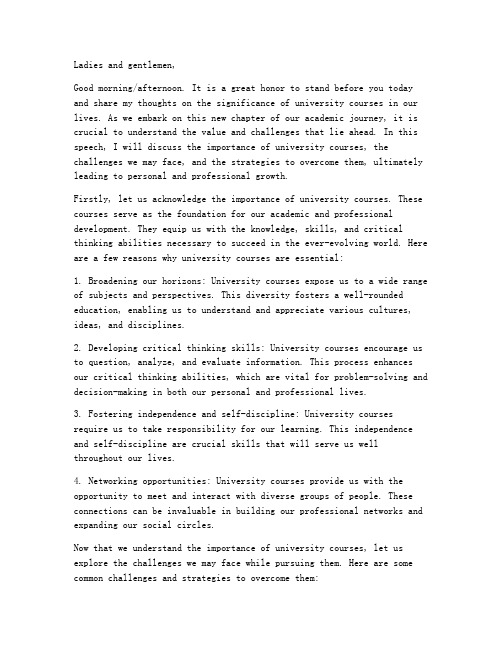
Ladies and gentlemen,Good morning/afternoon. It is a great honor to stand before you today and share my thoughts on the significance of university courses in our lives. As we embark on this new chapter of our academic journey, it is crucial to understand the value and challenges that lie ahead. In this speech, I will discuss the importance of university courses, the challenges we may face, and the strategies to overcome them, ultimately leading to personal and professional growth.Firstly, let us acknowledge the importance of university courses. These courses serve as the foundation for our academic and professional development. They equip us with the knowledge, skills, and critical thinking abilities necessary to succeed in the ever-evolving world. Here are a few reasons why university courses are essential:1. Broadening our horizons: University courses expose us to a wide range of subjects and perspectives. This diversity fosters a well-rounded education, enabling us to understand and appreciate various cultures, ideas, and disciplines.2. Developing critical thinking skills: University courses encourage us to question, analyze, and evaluate information. This process enhances our critical thinking abilities, which are vital for problem-solving and decision-making in both our personal and professional lives.3. Fostering independence and self-discipline: University courses require us to take responsibility for our learning. This independence and self-discipline are crucial skills that will serve us well throughout our lives.4. Networking opportunities: University courses provide us with the opportunity to meet and interact with diverse groups of people. These connections can be invaluable in building our professional networks and expanding our social circles.Now that we understand the importance of university courses, let us explore the challenges we may face while pursuing them. Here are some common challenges and strategies to overcome them:1. Managing time effectively: University courses often require us to balance multiple responsibilities, such as attending lectures, completing assignments, and engaging in extracurricular activities. To manage our time effectively, we can create a schedule, prioritize tasks, and allocate specific time slots for studying and relaxation.2. Adapting to a new learning environment: The transition from high school to university can be challenging. To adapt, we should actively participate in class, seek help from professors and peers, and explore university resources such as libraries and tutoring centers.3. Handling academic pressure: University courses can be demanding, and it is not uncommon to feel overwhelmed at times. To cope with academic pressure, we should maintain a healthy lifestyle, practice stress management techniques, and seek support from friends, family, and mental health professionals when needed.4. Balancing personal and academic life: University courses can take upa significant portion of our time and energy. To maintain a healthy balance, we should set aside time for personal activities, hobbies, and social interactions. This will not only help us de-stress but also contribute to our overall well-being.In conclusion, university courses are an invaluable asset on our path to personal and professional growth. They provide us with the knowledge, skills, and experiences necessary to succeed in the future. While we may face challenges along the way, it is essential to embrace these challenges as opportunities for learning and growth.To sum up, here are a few key takeaways from today's speech:- University courses are essential for broadening our horizons, developing critical thinking skills, fostering independence, and networking.- We may face challenges such as managing time, adapting to a new environment, handling academic pressure, and balancing personal and academic life.- To overcome these challenges, we should create a schedule, seek help when needed, practice stress management techniques, and maintain a healthy balance between personal and academic life.Ladies and gentlemen, as we embark on this journey of learning and growth, let us remember that the university courses we undertake are more than just academic requirements. They are the stepping stones that will shape our future and contribute to a better world. Together, let us embrace the challenges, seize the opportunities, and make the most of our university experience.Thank you for your attention.。
大学英语上课演讲稿范文(3篇)
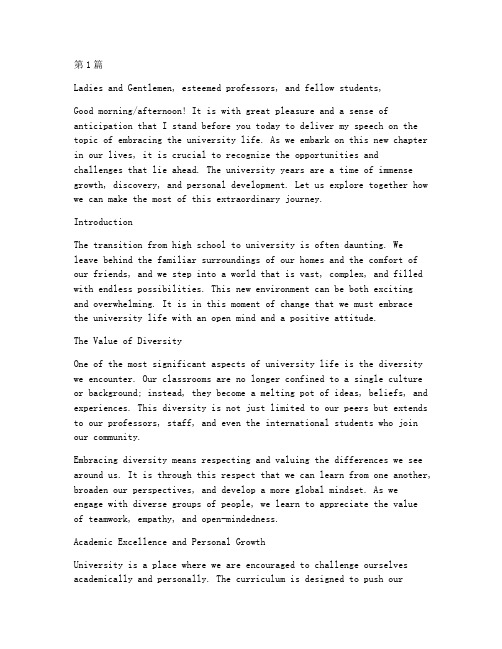
第1篇Ladies and Gentlemen, esteemed professors, and fellow students,Good morning/afternoon! It is with great pleasure and a sense of anticipation that I stand before you today to deliver my speech on the topic of embracing the university life. As we embark on this new chapter in our lives, it is crucial to recognize the opportunities andchallenges that lie ahead. The university years are a time of immense growth, discovery, and personal development. Let us explore together how we can make the most of this extraordinary journey.IntroductionThe transition from high school to university is often daunting. Weleave behind the familiar surroundings of our homes and the comfort of our friends, and we step into a world that is vast, complex, and filled with endless possibilities. This new environment can be both excitingand overwhelming. It is in this moment of change that we must embracethe university life with an open mind and a positive attitude.The Value of DiversityOne of the most significant aspects of university life is the diversity we encounter. Our classrooms are no longer confined to a single culture or background; instead, they become a melting pot of ideas, beliefs, and experiences. This diversity is not just limited to our peers but extends to our professors, staff, and even the international students who join our community.Embracing diversity means respecting and valuing the differences we see around us. It is through this respect that we can learn from one another, broaden our perspectives, and develop a more global mindset. As we engage with diverse groups of people, we learn to appreciate the valueof teamwork, empathy, and open-mindedness.Academic Excellence and Personal GrowthUniversity is a place where we are encouraged to challenge ourselves academically and personally. The curriculum is designed to push ourboundaries, introduce us to new subjects, and foster critical thinking skills. It is essential to approach our studies with enthusiasm and curiosity.Academic excellence is not just about achieving high grades; it is about the journey of learning and the passion we bring to our work. As we delve into our chosen fields, we discover our interests, talents, and potential. This personal growth is invaluable, as it shapes who we are and what we aspire to become.Balancing Academic and Social LifeUniversity life is not just about academics; it is also aboutsocializing and forming connections. Balancing our academic responsibilities with social activities is crucial for our overall well-being. Engaging in extracurricular activities, clubs, and societies allows us to explore our interests, meet like-minded individuals, and build a support network.It is important to remember that social interactions are an integral part of our growth. They help us develop communication skills, teamwork abilities, and a sense of community. By striking a balance between our academic and social lives, we can lead a more fulfilling and well-rounded university experience.The Importance of Time ManagementTime management is a skill that becomes increasingly important as we navigate the demands of university life. With multiple assignments, exams, and social events, it is easy to become overwhelmed. However, effective time management can help us stay organized, reduce stress, and maximize our productivity.To manage our time well, we must prioritize our tasks, set realistic goals, and allocate specific time slots for study and leisure. By doing so, we can create a healthy routine that allows us to excel in our studies while also enjoying our social life.Embracing Challenges and Overcoming AdversityUniversity life is not without its challenges. We may face academic difficulties, personal setbacks, or even financial struggles. It is in these moments that we must be resilient and determined.Embracing challenges means facing them head-on, seeking help when needed, and learning from our mistakes. Overcoming adversity builds character, teaches us valuable life lessons, and prepares us for future successes.ConclusionIn conclusion, embracing the university life is about opening ourselves to new experiences, embracing diversity, and pushing our boundaries. Itis a time for academic excellence, personal growth, and social development. By balancing our academic and social lives, managing our time effectively, and overcoming challenges, we can make the most ofthis extraordinary journey.As we step into this new chapter, let us do so with courage, determination, and a positive outlook. Remember that the universityyears are a time for growth, discovery, and the pursuit of our dreams. Together, we can create a vibrant and enriching university experiencethat will shape our future and leave a lasting impact on our lives.Thank you for your attention, and I wish each and every one of us a successful and memorable university journey.[The End]第2篇Ladies and Gentlemen,Good morning/afternoon! It is my great honor to stand before you todayto deliver a speech on the theme of "Embracing the College Experience: A Journey of Growth and Discovery." As we embark on this new chapter ofour lives, it is crucial that we understand the significance of this journey and the opportunities it presents. College is not just a place where we come to learn academic knowledge; it is a place where we growas individuals, discover our passions, and prepare for the future. Letus explore the various aspects of this transformative experience.Firstly, let us delve into the academic aspect of college life. The transition from high school to college is often daunting, as the academic rigor and expectations are significantly higher. However, this is where we truly begin to broaden our horizons and challenge ourselves intellectually. In college, we are exposed to a diverse range of subjects and perspectives that help us develop critical thinking and problem-solving skills. These skills are essential not only for our academic success but also for our personal and professional growth.To embrace this academic journey, we must be proactive in seeking knowledge. Attend lectures, participate in discussions, and engage with our professors and peers. Utilize the vast resources available to us, such as libraries, online databases, and tutoring services. Remember, college is not a race; it is a marathon. It is about building a strong foundation of knowledge that will serve us throughout our lives.Moreover, college is not just about academic achievements; it is also a time for personal growth. As we step out of our comfort zones and interact with people from different backgrounds, we begin to understand the importance of empathy, respect, and tolerance. College provides us with numerous opportunities to develop our interpersonal skills, such as teamwork, leadership, and communication. These skills are invaluable in both our personal and professional lives.One of the most rewarding aspects of college is the chance to explore our passions and interests. Whether it be through joining clubs, participating in sports, or engaging in volunteer work, college offers a platform for us to discover what truly matters to us. It is during these activities that we find our purpose and direction in life. We learn to balance our academic responsibilities with our personal interests, ensuring a well-rounded college experience.Furthermore, college is a crucial time for us to reflect on our values and beliefs. As we navigate through the complexities of the world, we are faced with ethical dilemmas and moral questions. College provides us with the space to explore these issues and develop our own perspectives. It is a time for self-discovery and introspection, where we learn to make informed decisions and stand up for what we believe in.In addition to personal growth, college also equips us with the necessary skills for the future. As we prepare to enter the workforce, it is essential that we are not only academically prepared but also professionally competent. College offers us opportunities to gain practical experience through internships, part-time jobs, and co-op programs. These experiences allow us to apply our knowledge in real-world settings, making us more competitive in the job market.Furthermore, college is a time to build a network of connections that will last a lifetime. We meet individuals from different cultures, countries, and walks of life, forming friendships and professional relationships that can be invaluable in our future endeavors. These connections can provide us with support, mentorship, and opportunities that we may not have encountered otherwise.As we embrace this college experience, it is important to remember that it is not solely about achieving academic excellence or personal growth. It is about finding balance and happiness. College can be challenging, and we may face setbacks along the way. However, it is through these challenges that we learn resilience, determination, and the strength to overcome obstacles.In conclusion, the college experience is a journey of growth and discovery. It is a time for us to expand our knowledge, develop our skills, and discover our passions. As we navigate through this transformative period of our lives, let us remember to be proactive, open-minded, and resilient. Embrace the opportunities that college presents, and let us make the most of this incredible journey.Thank you for your attention, and may your college experience be filled with success, joy, and countless memories.[Your Name]第3篇Ladies and Gentlemen,Good morning/afternoon, everyone. It is a great pleasure to stand before you today and share my thoughts on the college experience. As we embark on this new chapter of our lives, it is essential to understand that college is not just about attending lectures and earning a degree; it is a journey of personal growth, discovery, and self-realization. In this speech, I will highlight the key aspects of the college experience that I believe are crucial for our development and success.Introduction: The Significance of CollegeFirstly, let us acknowledge the significance of college in our lives. College is a unique environment that provides us with the opportunity to broaden our horizons, develop critical thinking skills, and prepare us for the challenges of the future. It is a place where we can explore various subjects, engage in meaningful discussions, and build a strong foundation for our careers and personal lives.1. Academic ExcellenceAcademic excellence is the cornerstone of the college experience. It is here that we are exposed to a wide range of subjects, from the humanities to the sciences, from the arts to the social sciences. This diversity allows us to discover our passions and strengths, and to cultivate a well-rounded perspective on the world.To achieve academic excellence, we must be disciplined and committed. We should take advantage of the resources available to us, such as libraries, tutors, and study groups. It is also important to seek help when needed and to stay motivated, even during challenging times.2. Personal GrowthCollege is a time for personal growth. It is a place where we can challenge ourselves, step out of our comfort zones, and develop new skills. We learn to manage our time, prioritize tasks, and work independently. These skills are invaluable, as they will serve us well throughout our lives.Personal growth also involves self-reflection. We should take the time to understand our values, beliefs, and goals. This self-awareness will help us make informed decisions and navigate the complexities of life.3. Networking and RelationshipsNetworking and building relationships are crucial aspects of the college experience. The connections we make here can have a lasting impact on our future. We should actively engage with our peers, professors, and other members of the college community.Networking can open doors to internships, job opportunities, and mentorship. It also allows us to exchange ideas, learn from one another, and create a supportive community.4. Extracurricular ActivitiesParticipating in extracurricular activities is an excellent way to enhance our college experience. These activities can range from sports and clubs to volunteer work and community service. They provide us with a sense of belonging, help us develop leadership skills, and foster a sense of teamwork.Extracurricular activities also allow us to pursue our interests and passions outside the classroom. They can be a great source of stress relief and a way to connect with others who share our interests.5. Cultural Exchange and DiversityCollege is a melting pot of cultures and ideas. It is a place where we can learn from and appreciate the diversity of others. This cultural exchange enriches our understanding of the world and prepares us to work and live in a global society.We should embrace the opportunity to interact with people from different backgrounds and perspectives. This exposure will broaden our horizons and make us more adaptable and empathetic individuals.Conclusion: Embracing the College ExperienceIn conclusion, the college experience is a transformative journey that can shape our future in countless ways. It is a time for us to grow academically, personally, and socially. By embracing the opportunities that college offers, we can prepare ourselves for the challenges and successes that lie ahead.As we move forward, let us remember that college is not just about the knowledge we gain, but also about the experiences we have and the people we meet. Let us approach this journey with an open mind, a willing heart, and a determination to make the most of our time here.Thank you for your attention, and I wish you all a rewarding andfulfilling college experience.Note: This speech is a general framework and can be tailored to fit specific themes or occasions.。
大学选修课英语作文

大学选修课英语作文英文回答:I think taking elective courses in college is really important. It allows students to explore their interests and passions outside of their major, and it can also help them develop new skills and knowledge that can bebeneficial in their future careers.For example, when I was in college, I decided to take a photography elective even though my major was in business.I had always been interested in photography, but I never had the opportunity to learn more about it. Taking this elective allowed me to not only improve my photography skills, but also to meet new people who shared the same interest. It was a great way for me to relax and have fun while still learning something new.I also believe that taking electives can help students become more well-rounded individuals. By exploringdifferent subjects, students can gain a broader perspective and learn to think critically about various topics. Thiscan be beneficial in their personal and professional lives, as they will be able to approach problems from different angles and come up with creative solutions.中文回答:我认为在大学选修课非常重要。
英语演讲选修课chapter 1ABC
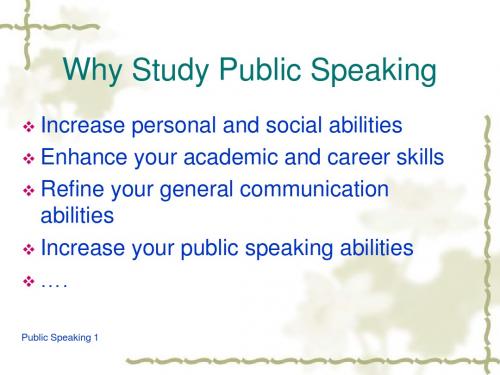
Why Study Public Speaking
Increase personal and social abilities Enhance your academic and career skills Refine your general communication abilities Increase your public speaking abilities ….
Public Speaking 1
Other tips for dealing with nervousness
Be at your best physically and mentally. A good night’s sleep will serve you better. As you are waiting to speak, quietly tighten and relax your leg muscles, or squeeze your hands together and then release them. Such actions help reduce tension by providing an outlet for your extra adrenaline.
Public Speaking 1
Increase Personal and Social Abilities
self-awareness self-confidence dealing with the fear of communicating
Public Speaking 1
Public Speaking VS Conversation
Public Speaking 1
英语演讲选修课chapter 8 Special

“Children, we have a very important guest with us today. He is the number one policeman in our city, the head of all the other police officers. Besides knowing a lot about crime right here at home, the police commissioner has also spent time working with Interpol – a special group of police officers who deal with crimes around the world. Today he is going to talk about how all of us can help to prevent crime. Let’s give a big round of applause and listen carefully to police commissioner Robert Washington.”
Focus on the accomplishments of the recipient
The audience doesn’t want a detailed biography of the recipient. You just need to highlight his achievements. The speech of presentation will be very brief, rarely more than five minutes long.
1. Speech of introduction
英语演讲选修课chapter2topic5篇
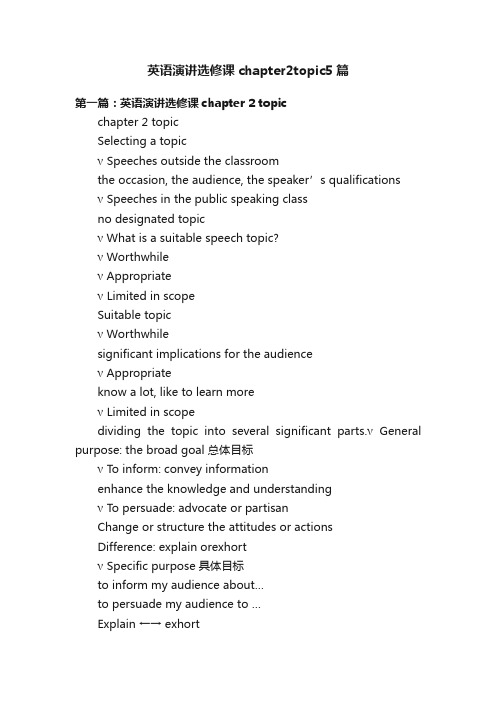
英语演讲选修课chapter2topic5篇第一篇:英语演讲选修课chapter 2 topicchapter 2 topicSelecting a topicν Speeches outside the classroomthe occasion, the audience, the speaker’s qualificationsν Speeches in the public speaking classno designated topicν What is a suitable speech topic?ν Worthwhileν Appropriateν Limited in scopeSuitable topicν Worthwhilesignificant implications for the audienceν Appropriateknow a lot, like to learn moreν Limited in scopedividing the topic into several significant parts.νGeneral purpose: the broad goal 总体目标ν T o inform: convey informationenhance the knowledge and understandingν T o persuade: advocate or partisanChange or structure the attitudes or actionsDifference: explain orexhortν Specific purpose 具体目标to inform my audience about…to persuade my audience to …Explain ←→ exhortSpecific PurposeνSpecific purpose:(single infinitive phrase that states precisely what a speaker hopes toaccomplish in his or her speech.).简单的肯定句ν T opic:Emergenciesν General purpose: To informν Specific purpose: To inform my audience of the major steps in responding to anemergencyTips for formulating the specific purpose statementTip 1:Write the purpose statement as a full infinitive phrase(完整的短语), not as a fragment(片段)νTip 2Express your purpose as a statement, not as a question陈述句Tip 3Avoid figurative language比喻语言Tip 4 Limit your purpose statement to one distinct idea, or one main pointTip 5Make sure your specific purpose is not too vague or general Phrasing the central idea(Also called thesis statement,subject sentence, major thought)νWhat is the central idea?νGuidelines for the central ideaWhat is the central idea?ν A one-sentence statement that sums up the major ideas of a speech.It is what you wantthe audience to absorb from your speech.νIn persuasivespeechesarguable, debatable, take your stanceν In informative speechesrelatively neutral and objectiveνThe specific purpose of a speech is what you hope to accomplish.ν The central idea is a concise statement of what you expect to say.νGuidelines for the central ideaν The central idea1.Should be expressed in a full sentence2.should not be in the form of a question.3.should avoid figurative language4.should not be vague or overly generalSummaryν Selecting a topicν Determining your general purposeν Determining your specific purposeν Phrasing your central ideaFour brainstorming proceduresνMake a quick inventory of your hobbies, interests, skills, experiences, beliefs, and soforth.ν Use the technique of clustering and write down on a sheet of paper the first topics thatcome to mind in several categories.νLook through a reference work for ideasν Use a World Wide Web subject directory such as Yahoo to help you scan possible topic.第二篇:英语演讲选修课10informativeLesson 10 Informative Teaching Aim and Requirement Aimed at ensuring the Ss to have a basic knowledge of publicspeaking.Teaching methods PPt, interact between teacher & student AssignmentsWhat are the essentials of an effective speech? How to overcome nervousness? Teaching proceduresνInformative speech: a speech designed to convey knowledge and understanding ν T o enhance the knowledge and understanding of your listeners---to give them information they did not have before νConvey clearly accurately interestingly Organizational methodsν Chronological order编年顺序ν Spatial order空间顺序ν Topical order主题顺序ν Causal order ν Problem-solution orderOther methods of speech organizationν Causal order: A show a cause-effect relationship.method of speech organization in which the main pointsν Problem-solution order: A method of speech organization in which the first main point deals with the existence of a problem and the second main point presents a solution to the problem.ν(Problem-cause-solution order)Speeches about processνProcess: A systematic series of actions that leads to a specific result or product.νSpeeches of process explain how something is made, how something is done, or how something works.3.Speeches about eventsνEvent: Anything that happens or is regarded as happening.ν chronological order----to recount the history of an event, ν causal order----to explain the causes and effects4.Speech about conceptsνConcept: A belief, theory, idea, notion, principle, or the like.ν Speeches about concepts are usually organized in topical order.One common approach is to list the main features or aspects of your concept.Guidelines for informative speaking λDon’t overestimate what the audience knows.* Lead your audience step by step and explain everything thoroughly.2.Relate the subject directly to the audience* What is fascinating to the speaker may not be fascinating to everybody.* Get your listeners involved3.Don’t be too technica l* Simple, clear language is needed.4.Avoid abstractions One way to avoid abstractions is through description(a statement that depicts a person, event, idea, or the like with clarity and vividness) Another way to escape abstraction is with comparisons(A statement of the similarities among two or more people, events, ideas, etc.)5.Personalize your ideas第三篇:英语演讲选修课11persuasiveLesson 11 Persuasive Teaching Aim and Requirement Aimed at ensuring the Ss to have a basic knowledge of public speaking.Teaching methods PPt, interact between teacher & student AssignmentsWhat are the essentials of an effective speech? How to overcome nervousness? Teaching proceduresI.Persuasive speeches on questions of factν Questions of fact---A question about the truth or falsity of an assertion.νWe do not know enough information to know what it isWill the economy be better or worse next year?Will another earthquake strike California before the year2010? ν The facts are murky or inclusiveWhat will happen next in the Middle East?Is sexual orientation genetically determined?Speeches On questions of fact are usually organized topically II.Persuasive speeches on questions of valueνQuestions of value?---A question about the worth, rightness, morality, and so forth of an idea or action.ν What is the best movie of all time? Is the cloning of human beings morally justifiable? What are the ethical responsibilities of journalists? νMatter of fact, value judgments νSpeeches on questions of value are mostly organized topicallyν Your first main point is to establish the standards for your value judgment.树立价值判断的标准ν Your second main point is to apply those standards to the subject.III.Persuasive speeches on questions of policy Questions of policy---A question about whether a specific course of action should or should not be taken.是否采取行动What to do during spring vocation? Which strategy to use in selling a product? How to maintain economic growth and protect the enviroment ? ν They are to decide whether something should or should not be anizing speeches on Questions of policyλProblem-solution order λProblem-cause-solution orderλComparative Advantage orderλD.Monroe’s motivated sequenceD.Monroe’s motivated sequence门罗促动顺序νA method of organizing persuasive speeches that seek immediate action.ν The five steps of the motivated sequence are:1.attention2.need3.satisfaction4.visualization(形象化)5.actionPart 2: Methods of persuasionListeners will be persuaded by a speaker from one or more of four reasons:I.credibility.II.evidence.III.reasoning.IV.emotionsI.Building credibilityν Factors of credibility:petence---how an audience regards a speaker’s intelligence, expertise, and knowledge of the subject.B.Character---how an audience regards a speaker’s sincerity, trustworthiness, and concern for the well-being of the audience.2.Establishing common ground with your audience ν Creating common ground---a technique in which a speaker connects himself or herself with the values, attitudes, or experiences of the audience.3.Deliver your speeches fluently, expressively, and with conviction ing evidenceTips for using evidence e specific e novel e evidence from credible sources 4.Make clear the point of your evidence.III.Reasoningν Reasoning---the process of drawing a conclusion on the basis of evidence.ν Four types of reasoning:1.Reasoning from specific instances2.Reasoning from principle3.Causal reasoning4.Analogical reasoningGuidelines for reasoning from specific instancesA.Avoid generalizing too hastily, make sure your sample of specific instances is large enough to justify your conclusion.B.Be careful with your wording.If your evidence does not justify a conclusion, qualify your argument.C.Reinforce your argument with statistics and testimony 2.Reasoning from principle ν---Reasoning that moves from a general principle to a specific conclusion.For instance: νAll people are mortal.νSocrates is a person.νTherefore, Socrates is mortal.3.Causal reasoning---Reasoning that seeks to establish the relationship between causes and effects.νThere is a patch of ice on the sidewalk.You slip, fall, and break your arm.You reason as follows: “Because that patch of ice was there, I fell and broke my arm.” orν“If the patch of ice hadn’t been there, I wouldn’t have fallen and broken my arm.” ν4.Analogical reasoning(类比推理)---Reasoning in which a speaker compares two similar cases and infers that what is true for the first case is also true for the second.ν If you are good at racquetbal l, you’ll be great at Ping-Pang.ν In Great Britain the general election campaign fro Prime Minister lasts less than three weeks.Surely we can do the same with the U.S presidential election.IV.Appealing to emotions ν Emotional appeals are intended to make listeners feel sad, angry, guilty, afraid, happy, proud, sympathetic, reverent, or the like.These are often appropriate reactions when the question is one of value or policy.νGuidelines for generating emotional appealν e emotional language 2.Develop vivid example 3.Speakwith sincerity and conviction第四篇:英语演讲选修课7language_delivery范文Lesson 7 Language delivery Teaching Aim and Requirement Acquire a basic knowledge of topic,purpose and central idea of a public speech。
英语公共演讲选修课总结(英文)

英语公共演讲选修课总结(英文)第一篇:英语公共演讲选修课总结(英文)Summing-upThe class of Public English Speaking and Debating is coming to an end, but what the class brings and teaches me are precious and important.They may change my whole life.The next, I want to share with you my experiences and gains from the class and practice.At the beginning of class, we share the recent news with others.I think this kind of practice is very helpful and effective.We not only knew what is happening around in the world but also improved the ability of speaking in front of people, concluding issues and judging things objectively.I cherished every chance to share the news, so each time I got full preparations to reading news, summarizing and making some own comments on it.You pay, you gain.Yes, I gained a lot and now I have developed a habit of reading news everyday.I hope sharing news will be kept, it is really a good way to practise.Besides the calss, I got some benefits from the practice after class.From a several debating competitions that I have visited, I got the knowledge that there was no need to be afraid of English speaking, there was also no need to be so nervous though confronted with many peoole, beacause no one will laugh at your mistakes.So, stand on the stage bravely and spesk loudly to every audience.Then you will find it is not so difficult as you image in fact while you practise yourself simultaneously.Graze every opportunity to speak in public and you can earn more.Thanks for the class of Public English Speaking and Debating, I could gain so much.These valuable experiences and earns could be useful in my whole life and I hope the next term, I can still choose this course.第二篇:公共选修课指南忽然看到大家又在开始分享公共选修课指南了,我才突然发现下个学期是该是大一的孩子们第一次选课的时候啦,作为刚刚步入大二的学长呢,感觉这个指南有点老啦,当年我也看过这个,不过和我自己体验的有些不一样,同样也有一些自己的感悟,希望对大一新生有帮助。
英语演讲选修课chapter 4 introduction
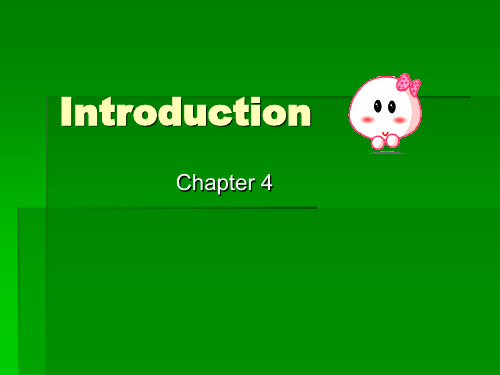
Relate the topic to the audience
Today I am going to talk about collecting postcards---a hobby that is both fascinating and financially rewarding. I would like to explain the basic kinds of collectible postcards, why they are so valuable, and how collectors buy and sell cards.
Arouse the curiosity of the audience
Example one: It is the most common chronic disease in the United States. Controllable but incurable, it is a symptomless disease. You can have it for years and never know until it kills you. Some 40 million Americans have this disease, and 300,000 will die from it before the years is out. Odds are that five of us in this class have it.
More than 17,000 everyday---more than half a million every month…..And adolescents in our country suffer the highest rates of murder and suicide among the 26 wealthiest nations.
英语演讲Chapter4 Selecting a topic and a purpose

4 Phrasing the central idea
• Central idea: A one-sentence statement that sums up or encapsulates the major ideas of a speech. • The specific purpose of a speech is what you hope to accomplish. • The central idea is usually expressed as a simple, declarative sentence that refines and sharpens the specific purpose statement.
Topic: Qipao. General Purpose: To inform. Specific Purpose: To inform my audience of the history, styles, and cultural impact of qipao. Central Idea: Qipao was created in the 1920s,comes a number of styles, and has exerted significant cultural impact on ChinesVery likely, a number of items on your lists will strike you as potential topics. Try to free-associate. Write down a word or idea. What does that trigger in your mind? Whatever it is, write that down next and keep going until you have several ideas. • For example, working from the lists above, on speaker composed sublists for movies, three-gorges and Yang Liwei. In the first column, movies made her think of the academy awards, the academy awards remind her of prizes, then lotteries. Lotteries is a form of gambling. Suddenly, this speaker remembered an article she had read on the problem of gambling addiction. The idea clicked in her mind. Then she developed an excellent speech titled “ Gambling Addiction”.
谈论选修课英语作文范文

谈论选修课英语作文范文Talking about Elective Courses。
As students, we all have to take some compulsory courses, such as Chinese, math and English. However, we also have the opportunity to choose some elective courses according to our interests and hobbies. In this essay, I will talk about the advantages and disadvantages ofelective courses.Firstly, elective courses can broaden our horizons and enrich our knowledge. For example, if we choose a course on music or art, we can learn about different styles and techniques, and appreciate the beauty of different forms of art. If we choose a course on history or politics, we can learn about the development of human civilization and the current affairs of the world. In this way, we can acquire more knowledge and become more informed and cultured individuals.Secondly, elective courses can help us develop our interests and talents. If we choose a course on sports or music, we can improve our skills and abilities in these areas, and even develop a career in them in the future. If we choose a course on literature or writing, we can enhance our creativity and expressiveness, and even become a writer or journalist in the future. In this way, we can pursue our passions and realize our potentials.However, elective courses also have some disadvantages. Firstly, some courses may not be practical or useful in our future careers or lives. For example, if we choose a course on astrology or fortune-telling, we may waste our time and money on something that has no real value or benefit. Secondly, some courses may be too difficult or challenging for us, and may lower our overall academic performance and GPA. For example, if we choose a course on advanced math or physics, we may struggle and fail, and may even regret our choice.In conclusion, elective courses are both advantageous and disadvantageous, and we should choose them wisely andresponsibly. We should consider our interests, talents, goals and values, and choose the courses that can benefit us the most. We should also seek advice and guidance from our teachers, parents and peers, and learn from their experiences and perspectives. In this way, we can make the most of our elective courses and become better students and individuals.。
英语演讲Chapter4 Selecting a topic and a purpose

2 Determining the general purpose
• People will fall into one of two overlapping categories– to inform or to persuade.
• When your general purpose is to inform, you act as teacher or lecture , your aim is to enhance the knowledge and understanding of your listener . • When your general purpose is t persuade, you act like an advocate or a partisan , you want to change or structure the attitudes or actions of your audience.
Topic: Qipao. General Purpose: To inform. Specific Purpose: To inform my audience of the history, styles, and cultural impact of qipao. Central Idea: Qipao was created in the 1920s,comes a number of styles, and has exerted significant cultural impact on Chinese women.
• Another way to think of your central idea is as your residual message. • Most of the time the central idea will encapsulate the main points to be developed in the body of the speech. For example:
介绍一门选修课英语作文 模板
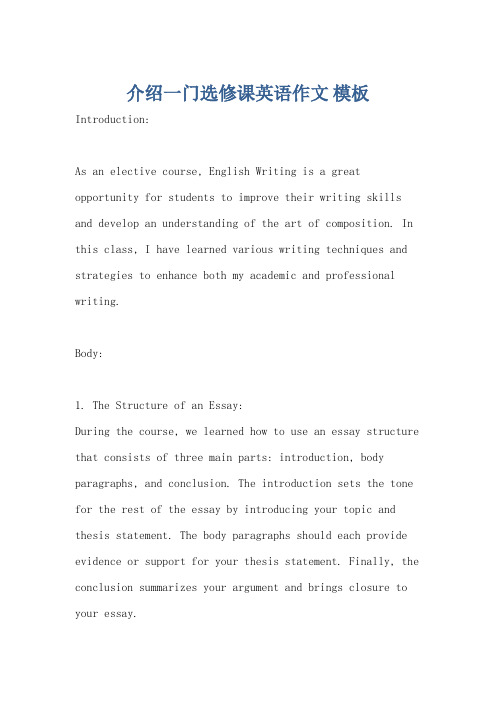
介绍一门选修课英语作文模板Introduction:As an elective course, English Writing is a great opportunity for students to improve their writing skills and develop an understanding of the art of composition. In this class, I have learned various writing techniques and strategies to enhance both my academic and professional writing.Body:1. The Structure of an Essay:During the course, we learned how to use an essay structure that consists of three main parts: introduction, body paragraphs, and conclusion. The introduction sets the tone for the rest of the essay by introducing your topic and thesis statement. The body paragraphs should each provide evidence or support for your thesis statement. Finally, the conclusion summarizes your argument and brings closure to your essay.2. The Importance of Grammar:In order to communicate effectively in written form, grammar is crucial. This course taught us how to properly use grammar rules regarding sentence structure, verb tense, subject-verb agreement, and punctuation.3. Avoiding Common Mistakes:One thing I have learned through this course is how to avoid common mistakes in my writing such as using passive voice or repeating words/phrases too often.4. Different Types of Essays:This course also helped us understand how different types of essays require different approaches to composition such as cause/effect essays or persuasive essays. We were given ample opportunities to practice these techniques in our own writing assignments.Conclusion:In conclusion, this elective English Writing class has beena valuable addition to my coursework because it gave me a better understanding of the fundamentals of good writing practices; from essay structure & grammar components all the way through avoiding common mistakes & types of essays required based on topics which are being presented before me during assessment timeframes in class activities!。
英语演讲选择进修课期末深刻复习最后大归纳
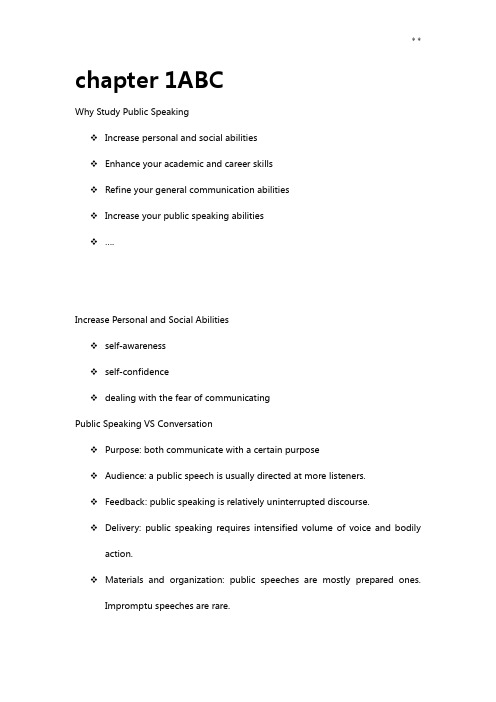
chapter 1ABCWhy Study Public Speaking❖Increase personal and social abilities❖Enhance your academic and career skills❖Refine your general communication abilities❖Increase your public speaking abilities❖….Increase Personal and Social Abilities❖self-awareness❖self-confidence❖dealing with the fear of communicatingPublic Speaking VS Conversation❖Purpose: both communicate with a certain purpose❖Audience: a public speech is usually directed at more listeners.❖Feedback: public speaking is relatively uninterrupted discourse.❖Delivery: public speaking requires intensified volume of voice and bodily action.❖Materials and organization: public speeches are mostly prepared ones.Impromptu speeches are rare.The essentials of a speech❖Objective: why am I making this speech?❖Audience:whom am I making this speech to?❖Place:where❖Time and length❖Method of delivery:how❖Content:what❖Notes❖Rehearsal: identify weakness, practice difficult pronunciationsDealing with nervousness❖Acquire speaking experience❖Prepare, prepare, prepare❖Think positively❖Use the power of visualization❖Know that most nervousness is Not visible❖Don’t expect perfectionAcquire Speaking Experience❖Enrolled in a public speaking course❖Stage fright: fear of the unknown❖Learning to give a speech is not much different from learning any otherskill---it proceeds by trial and error. The purpose of your speech class is to shorten the process, to minimize the errors, to give you a nonthreatening arena---a sort of laboratory--- in which to undertake the “trial”Think positivelyConfidence is mostly the well-known power of positive thinking.Negative Thought & Positive Thought❖I wish I didn’t have to give this speech.This speech is a chance for me to share my ideas and gain experience as a speaker.❖I am not a great public speaker.No one is perfect, but I am getting better with each speech I give.Terms❖Positive nervousness---controlled nervousness that helps energize a speaker for her or his presentation.❖Visualization---mental imaging in which a speaker vividly pictures herself or himself giving a successful presentation.❖Creat a vivid mental blurprint in which you see yourself succeeding in your speechOther tips for dealing with nervousness❖Be at your best physically and mentally. A good night’s sleep will serve you better.❖As you are waiting to speak, quietly tighten and relax your leg muscles, or squeeze your hands together and then release them. Such actions help reduce tension by providing an outlet for your extra adrenaline.❖Take a couple slow, deep breaths before you start to speak. Most people take short and shallow breaths, which only reinforces their anxiety. Deep breathing breaks this cycle of tension and help calm your nerves.❖Work especially hard on your introduction. Research has shown that a speaker’s anxiety level begins to drop significantly after the first 30 seconds of a presentation❖Make eye contact with members of your audience. Remember that they are individual people, not a blur of faces. And they are your friends.❖Concentrate on communicating with your audience rather than on worrying about your stage fright. If you get caught up in your speech, your audience will too.❖Use visual aids. They create interest, draw attention away from you, and make you feel less self-conscious.chapter 2 topic Selecting a topic⏹Speeches outside the classroomthe occasion, the audience, the speaker’s qualifications⏹Speeches in the public speaking classno designated topic⏹What is a suitable speech topic?⏹Worthwhile⏹Appropriate⏹Limited in scopeSuitable topic⏹Worthwhilesignificant implications for the audience⏹Appropriateknow a lot, like to learn more⏹Limited in scopedividing the topic into several significant parts.⏹General purpose: the broad goal 总体目标⏹To inform: convey informationenhance the knowledge and understanding⏹To persuade: advocate or partisanChange or structure the attitudes or actionsDifference: explain or exhort⏹Specific purpose 具体目标to inform my audience about…to persuade my audience to …Explain ←→exhortSpecific Purpose⏹Specific purpose: ( single infinitive phrase that states precisely what aspeaker hopes to accomplish in his or her speech.). 简单的肯定句⏹Topic: Emergencies⏹General purpose: To inform⏹Specific purpose: To inform my audience of the major steps in responding toan emergencyTips for formulating the specific purpose statementTip 1: Write the purpose statement as a full infinitive phrase(完整的短语), not as a fragment(片段)Tip 2Express your purpose as a statement, not as a question陈述句Tip 3 Avoid figurative language比喻语言Tip 4 Limit your purpose statement to one distinct idea, or one main pointTip 5Make sure your specific purpose is not too vague or generalPhrasing the central idea(Also called thesis statement, subject sentence, major thought )⏹What is the central idea?⏹Guidelines for the central ideaWhat is the central idea?⏹ A one-sentence statement that sums up the major ideas of a speech. It iswhat you want the audience to absorb from your speech.⏹In persuasive speechesarguable, debatable, take your stance⏹In informative speechesrelatively neutral and objective⏹The specific purpose of a speech is what you hope to accomplish.⏹The central idea is a concise statement of what you expect to say.⏹Guidelines for the central idea⏹The central idea1. Should be expressed in a full sentence2.should not be in the form of a question.3. should avoid figurative language4. should not be vague or overly generalSummary⏹Selecting a topic⏹Determining your general purpose⏹Determining your specific purpose⏹Phrasing your central ideaFour brainstorming procedures⏹Make a quick inventory of your hobbies, interests, skills, experiences, beliefs,and so forth.⏹Use the technique of clustering and write down on a sheet of paper the firsttopics that come to mind in several categories.⏹Look through a reference work for ideas⏹Use a World Wide Web subject directory such as Yahoo to help you scanpossible topic.chapter 3 Analysis Analyzing the audience1. Audience-centeredness 以听众为中心2. The psychology of audience 听众的心理3. Demographic audience analysis 听众分析统计4. Situational audience analysis 听众分析的具体情形5. Adapting to the audience 适应听众1. Audience-centeredness▪Audience-centeredness: keeping the audience foremost in mind at every step of speech preparation and presentation.Questions to be asked when preparing▪To whom am I speaking?▪What do I want them to know, believe, or do as a result of my speech?▪What is the most effective way of composing and presenting my speech to accomplish that aim?(how)2. The psychology of audiences▪Question: what do you do when you listen to a speech?▪two messages:speaker, filter, listener▪people hear what they want to hear and disregard the rest.▪Question: what do people want to hear?▪Meaningful▪Egocentrism: The tendency of people to be concerned above all with their own values, beliefs, and well-being.▪Listeners typically approach speeches with one question uppermost in mind: “Why is this important to me?”What do these psychological principles mean to you as a speaker?▪Listeners: what they already know▪Speakers: relate the message toTwo steps of demographic audience analysis⑴identifying the general demographic features of your audience⑵assessing the importance of those features to a particular speaking situationDemographic Audience Analysis▪Age▪Gender▪Sexual orientation▪Racial, ethnic and cultural background ▪Religion4. Situational audience analysis:▪Situational factorsSizePhysical settingDisposition toward the topicDisposition toward the speakerDisposition toward the topic▪Interest▪Knowledge▪AttitudeDisposition toward the speaker▪keep in mind that your listeners will always have some set of attitudes toward you as a speaker.▪Estimating what those attitudes are and how they will affect your speech is a crucial part of situational audience analysis.Summary▪audience-centered. They know that the aim of speechmaking is to gain a desired response from listeners. When working on your speeches, keep three questions in mind:(1)To whom am I speaking?(2)What do I want them to know, believe, or do as a result of my speech?(3)What is the most effective way of composing and presenting my speech to accomplish that aim?▪Psychology of audience.People hear what they want to hear.EgocentricWhy is this important to me?chapter4 ntroduction1. Getting attention and interest(1)Relate the topic to the audience(2)State the importance of your topic(3)Startle the audience(4)Arouse the curiosity of the audience(5)Question the audience(6)Begin with a quotation(7)Tell a story2. Reveal the topic3. Establish credibility▪Credibility: the audience’s perception of whether a speaker is qualified to speak on a given topic.Your credibility need not be based on firsthand knowledge and experience. It can come from reading, from classes, from interviews, from friends.4 Preview the body of the speech▪Preview statement 预先叙说▪ A statement in the introduction of a speech that identifies the main points to be discussed in the body of the speech.Tips for preparing the introduction1.Keep the introduction relatively brief. Under normal circumstances it shouldnot constitute more than 10 to 20 percent of your speech.2. Be on the lookout for possible introductory materials as you do your research. File them with your notes, so they will be handy when you are ready for them.3. Be creative in devising your introduction. Experiment with two or three different openings and choose the one that seems most likely to get the audience interested in your speech.4. Don’t worry about the exact wording of your introduction until you have finished preparing the body of the speech. After you have determined your main points, it will be much easier to make final decisions about how to begin the speech.5. Work out your introduction in detail. Some teachers recommend that you write it out word for word; others prefer that you outline it. Whichever method you use, practice the introduction over and over until you can deliver it smoothly from a minimum of notes and with strong eye contact. This will get your speech off to a good start and give you a big boost of confidence.Some common faults of introductions ▪Don’t apologize.▪Don’t pretend▪Don’t make hollow promises ▪Don’t rely on gimmicks▪Don’t preface your introductionchapter 5 conclusion To let the audience know you are ending the speech•“In conclusion”•“One last thought”•“In closing”•“My purpose has been”•“Let me end by saying”Reinforce the central idea1. Summarize your speech2. End with a quotation3. Make a dramatic statement4. Refer to the introduction5. MotivateTips for preparing the conclusion1. As with the introduction, keep an aye out for possible concluding materials as you research and develop the speech.2. Conclude with a bang, not a whimper. Be creative in devising a conclusion that hits the hearts and minds of your audience. Work on several possible endings, and select the one that seems likely to have the greatest impact.3.Do not be long-winded. The conclusion will normally make up no more thanabout 5 to 10 percent of your speech. Nothing aggravates audiences more than a speaker who says, “In conclusion”and keeps on talking.⏹chapter 6 -7 language_delivery⏹Language is important⏹Meaning of words⏹Using language accurately⏹Using language clearly⏹Using language vividly⏹Using language appropriately⏹ A note on inclusive languageUsing language clearly1. Use familiar words2. Choose concrete words3. Eliminate clutter2. Choose concrete words⏹Concrete words: words that refer to tangible objects⏹Abstract words: words that refer to ideas or concepts⏹Keep this in mind: few words are completely abstract or concrete.Abstractness and concreteness are relative.Two main ways to use moving and vivid language: imagery and rhythm1. Imagery: (意象)The use of vivid language to create mental images of objects, actions orideas.It is a word picture that gets you totally involved.Three ways to generate imagery:A. Concrete wordsB. Simile(明喻)An explicit comparison introduced with the word “like”or “as”between things that are essentially different yet have something in common. Example:C. Metaphor (暗喻)Unlike simile, metaphor does not contain the words “like”or “as”.2. Rhythm(节奏)The pattern of sound in a speech created by the choice and arrangement of words.Four basic stylistic devices to improve the rhythmA. Parallelism(排比):the similar arrangement of a pair or series of related words, phrases, or sentences. Examples:①Rich and poor, intelligent and ignorant, wise and foolish, virtuous and vicious, man and woman---it is ever the same, each soul must depend wholly on itself.(Elizabeth Cady Stanton)②There is no Negro problem. There is no Southern problem. There is no Northern problem. There is only an American problem. (Lyndon Johnson)③I speak as a Republican. I speak as a woman. I speak as a United Sates Senator. I speak as an American.(Margaret Chase Smith)B. RepetitionRepeating the same word or set of words at the beginning or end of successive clauses or sentences①When you see your street, see my street. When you see your house, see my house. When you see your children, see my children. (Whitney Young, Jr.)②We will not tire, we will not falter, we will not fail. (George W .Bush)C. Alliteration(头韵法)Repetition of the initial consonant sound of close or adjoining words. Examples: ①Peace is essential for progress, but progress is no less essential for Peace. (Liaquat Ali Khan)②In a nation founded on the promise of human dignity, our colleges, our communities, our country should challenge hatred wherever we find it. (Hillary Rodham Clinton)D. Antithesis 对比法The juxtaposition of contrasting ideas, usually in parallel structure. Examples: ①Ask not what your country can do for you; ask what you can do for your country. (John. F. Kennedy)②Your success as a family, our success as a society, depends not on what happens at the White House, but on what happens inside your house. (Barbara Bush)Using language appropriately恰当地使用语言1. Appropriate to the occasion2. Appropriate to the audience3. Appropriate to the topic4. Appropriate to the speakerA NOTE ON INCLUSIVE LANGUAGE⏹Inclusive language: language that does not stereotype, demean, orpatronize people on the basis of gender, race, religion, disability, sexual orientation, or other factors.Four basic methods of delivering a speech⏹Reading from a manuscript: A speech that is written out word for word andread to the audience.⏹Reciting from memory⏹Speaking impromptu: a speech delivered with little or no immediatepreparation.⏹Speaking extemporaneously: A carefully prepared and rehearsed speechthat is presented from a brief set of notes.The speaker’s voiceThe aspects of voice you should work to control are:⏹Volume 音量⏹Pitch 音高⏹Rate 频率⏹Pauses 停顿⏹Vocal variety 嗓音变化⏹PronunciationThe speaker’s voice⏹volume : the loudness or softness of the speaker’s voice.⏹Pitch: t he highness or lowness of the speaker’s voice.⏹Rate: the speed at which a person speaks.The speaker’s body1. Personal appearance2. Movement3. Gestures4. Eye contactThere are four basic methods of delivering a speech, They are⏹Reading from a manuscript.⏹Reciting from memory⏹Speaking impromptu⏹Speaking extemporaneouslychapter 8 SpecialSpeeches on special occasions1. Speech of introduction介绍性演讲2. Speech of presentation赠与演讲3. Speeches of acceptance受奖演讲4. Speeches of tribute赞扬5. Speeches of welcome 欢迎6. Speech of farewell欢送1. Speech of introduction▪ a speech that introduces the main speaker to the audience.Three purposes be achieved in the introduction▪Build enthusiasm for the upcoming speaker▪Build enthusiasm for the speaker’s topic▪Establish a welcoming climate that will boost the speaker’s credibilityGuidelines for speeches of introduction▪Be brief▪Make sure your remarks are completely accurate▪Don’t take the speaker’s job▪Adapt your remarks to the main speaker▪Try to create a sense of anticipation and drama▪Adapt your remarks to the audience比尔盖茨在清华大学的演讲.flv2. Speech of presentation▪ A speech that presents someone a gift, an award, or some other form of public recognitionGuidelines▪State the purpose of the award▪Focus on the accomplishments of the recipient▪Avoid over-praising3. Speeches of acceptance▪ A speech that gives thanks for a gift, an award, or some other form of public recognition▪ A speech of acceptance usually includes the following three steps.The first step▪Thank those who grant you the awardThe second step▪Thank those who helped you attain the award.The third step▪Accept the award graciously4.Speeches of tribute5. A speech that honors a person, a group or an event.6. A special form of the speech of tribute is the eulogy, a speech of praise usuallygiven for those who have recently died. A minister performing a funeral usually gives a speech of eulogy by praising and honoring the deceased.Speeches of tribute 我有一个梦想.flv▪Establish noble themes▪Be sincere▪Connect with the audience▪Appeal to the audiencechapter 9 supporting Three kinds of supporting materials⏹examples 实例⏹testimony 证词⏹statistics 统计数据Hypothetical example⏹An example that describes an imagery or fictitious situation 描述的是想象或虚构的情形Tips for using examples1. Use examples to clarify your ideas说明2. Use examples to reinforce your ideas强化3. Use examples to personalize your ideas使思想个人化II.Testimony⏹Testimony ---quotations or paraphrases used to support a point.引用或释义的用于支持观点的话---Expert testimony 专家证词---Peer testimony 普通人证词Tips for Using testimony1. quote or paraphrase accurately: make sure you do not misquote someone; make sure you do not violate the meaning of statements you paraphrase; make sure you do not quote out of context2. Use testimony from qualified sources. That is, use testimony from recognized experts or ordinary citizens with special experience on the speech topic.3. Use testimony from unbiased sources. Be sure to use testimony from credible, competent, objective authorities.4. Identify the people you quote or paraphrase. The usual way to identify your source is to name the person and sketch her or his qualifications before presenting the testimonyask yourself the following two questions:⏹Are the statistics representative?⏹Are the statistics from a reliable source?⏹Tips for using statistics1. Use statistics to quantity your ideas2. Use statistics sparingly3. Identify the source of your statistics4. Explain your statistics5. Round off complicated statistics6. Use visual aids to clarify statistical trends⏹C hapter 10 informative⏹Informative speech: a speech designed to convey knowledge andunderstanding⏹To enhance the knowledge and understanding of your listeners--- to givethem information they did not have before⏹Convey clearly accurately interestinglyOrganizational methods⏹Chronological order 编年顺序⏹Spatial order 空间顺序⏹Topical order 主题顺序⏹Causal order⏹Problem-solution orderOther methods of speech organization⏹Causal order: A show a cause-effect relationship. method of speechorganization in which the main points⏹Problem-solution order: A method of speech organization in which thefirst main point deals with the existence of a problem and the second mainpoint presents a solution to the problem.⏹(Problem-cause-solution order)Speeches about process⏹Process: A systematic series of actions that leads to a specific result orproduct.⏹Speeches of process explain how something is made, how something isdone, or how something works.3. Speeches about events⏹Event: Anything that happens or is regarded as happening.⏹chronological order----to recount the history of an event,⏹causal order ----to explain the causes and effects4. Speech about concepts⏹Concept: A belief, theory, idea, notion, principle, or the like.⏹Speeches about concepts are usually organized in topical order. Onecommon approach is to list the main features or aspects of your concept.Guidelines for informative speaking●Don’t overestimate what the audience knows.* Lead your audience step by step and explain everything thoroughly.2. Relate the subject directly to the audience* What is fascinating to the speaker may not be fascinating to everybody.* Get your listeners involved3. Don’t be too technical* Simple, clear language is needed.4. Avoid abstractionsOne way to avoid abstractions is through description (a statement that depicts a person, event, idea, or the like with clarity and vividness)Another way to escape abstraction is with comparisons (A statement of the similarities among two or more people, events, ideas, etc.)5. Personalize your ideaschapter11 persuasiveI. Persuasive speeches on questions of fact⏹Questions of fact ---A question about the truth or falsity of an assertion.⏹We do not know enough information to know what it isWill the economy be better or worse next year?Will another earthquake strike California before the year 2010?⏹The facts are murky or inclusiveWhat will happen next in the Middle East?Is sexual orientation genetically determined?Speeches On questions of fact are usually organized topicallyII. Persuasive speeches on questions of value⏹Questions of value? ---A question about the worth, rightness, morality, andso forth of an idea or action.⏹What is the best movie of all time? Is the cloning of human beings morallyjustifiable? What are the ethical responsibilities of journalists?⏹Matter of fact, value judgments⏹Speeches on questions of value are mostly organized topically⏹Your first main point is to establish the standards for your value judgment.树立价值判断的标准⏹Your second main point is to apply those standards to the subject.III. Persuasive speeches on questions of policyQuestions of policy ---A question about whether a specific course of action should or should not be taken.是否采取行动What to do during spring vocation?Which strategy to use in selling a product?How to maintain economic growth and protect the enviroment ?⏹They are to decide whether something should or should not be done.2. Organizing speeches on Questions of policy●Problem-solution order●Problem-cause-solution order●Comparative Advantage order●D. Monroe’s motivated sequenceD. Monroe’s motivated sequence门罗促动顺序⏹ A method of organizing persuasive speeches that seek immediate action.⏹The five steps of the motivated sequence are:1. attention2. need3. satisfaction4. visualization(形象化)5. actionPart 2: Methods of persuasionListeners will be persuaded by a speaker from one or more of four reasons:I. credibility.II. evidence.III. reasoning.IV. emotionsI. Building credibility⏹Factors of credibility:A. Competence---how an audience regards a speaker’s intelligence, expertise, and knowledge of the subject.B. Character---how an audience regards a speaker’s sincerity, trustworthiness, and concern for the well-being of the audience.2. Establishing common ground with your audience⏹Creating common ground---a technique in which a speaker connectshimself or herself with the values, attitudes, or experiences of the audience.3. Deliver your speeches fluently, expressively, and with convictionII. Using evidenceTips for using evidence1. Use specific evidence.2. Use novel evidence.3. Use evidence from credible sources4. Make clear the point of your evidence.III. Reasoning⏹Reasoning---the process of drawing a conclusion on the basis of evidence.⏹Four types of reasoning:1. Reasoning from specific instances2. Reasoning from principle3. Causal reasoning4. Analogical reasoningGuidelines for reasoning from specific instancesA. Avoid generalizing too hastily, make sure your sample of specific instances is large enough to justify your conclusion.B. Be careful with your wording. If your evidence does not justify a conclusion, qualify your argument.C. Reinforce your argument with statistics and testimony2. Reasoning from principle⏹---Reasoning that moves from a general principle to a specific conclusion.For instance:⏹All people are mortal.⏹Socrates is a person.⏹Therefore, Socrates is mortal.3. Causal reasoning---Reasoning that seeks to establish the relationship between causes and effects.⏹There is a patch of ice on the sidewalk. You slip, fall, and break your arm. Youreason as follows: “Because that patch of ice was there, I fell and broke my arm.”or⏹“If the patch of ice hadn’t been there, I wouldn’t have fallen and brokenmy arm.”⏹4. Analogical reasoning(类比推理)---Reasoning in which a speaker compares two similar cases and infers that what is true for the first case is also true for the second.⏹If you are good at racquetball, you’ll be great at Ping-Pang.⏹In Great Britain the general election campaign fro Prime Minister lasts lessthan three weeks. Surely we can do the same with the U.S presidential election.IV. Appealing to emotions⏹Emotional appeals are intended to make listeners feel sad, angry, guilty,afraid, happy, proud, sympathetic, reverent, or the like. These are often appropriate reactions when the question is one of value or policy.⏹Guidelines for generating emotional appeal⏹ 1. Use emotional language2. Develop vivid example3. Speak with sincerity and conviction。
英语演讲选修课chapter_8_Special
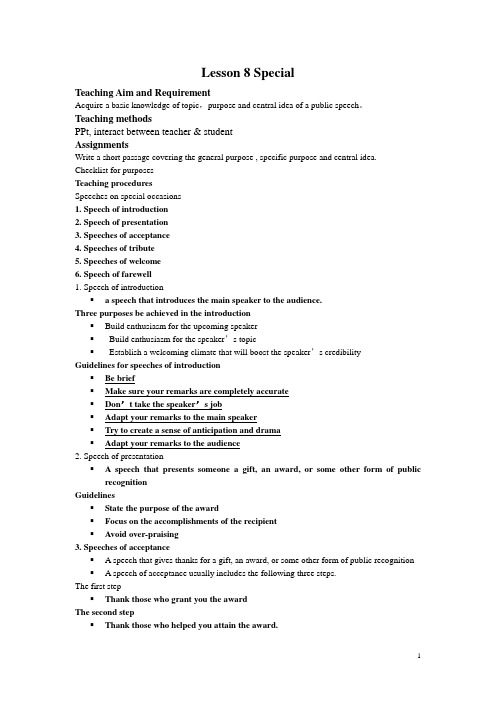
Lesson 8 SpecialTeaching Aim and RequirementAcquire a basic knowledge of topic,purpose and central idea of a public speech。
Teaching methodsPPt, interact between teacher & studentAssignmentsWrite a short passage covering the general purpose , specific purpose and central idea.Checklist for purposesTeaching proceduresSpeeches on special occasions1. Speech of introduction2. Speech of presentation3. Speeches of acceptance4. Speeches of tribute5. Speeches of welcome6. Speech of farewell1. Speech of introduction▪ a speech that introduces the main speaker to the audience.Three purposes be achieved in the introduction▪Build enthusiasm for the upcoming speaker▪Build enthusiasm for the speaker’s topic▪Establish a welcoming climate that will boost the speaker’s credibilityGuidelines for speeches of introduction▪Be brief▪Make sure your remarks are completely accurate▪Don’t take the speaker’s job▪Adapt your remarks to the main speaker▪Try to create a sense of anticipation and drama▪Adapt your remarks to the audience2. Speech of presentation▪ A speech that presents someone a gift, an award, or some other form of public recognitionGuidelines▪State the purpose of the award▪Focus on the accomplishments of the recipient▪Avoid over-praising3. Speeches of acceptance▪ A speech that gives thanks for a gift, an award, or some other form of public recognition ▪ A speech of acceptance usually includes the following three steps.The first step▪Thank those who grant you the awardThe second step▪Thank those who helped you attain the award.The third step▪Accept the award graciously4.Speeches of tribute5. A speech that honors a person, a group or an event.6. A special form of the speech of tribute is the eulogy, a speech of praise usually given for thosewho have recently died. A minister performing a funeral usually gives a speech of eulogy by praising and honoring the deceased.Speeches of tribute▪Establish noble themes▪Be sincere▪Connect with the audience▪Appeal to the audience。
英语选课演讲稿
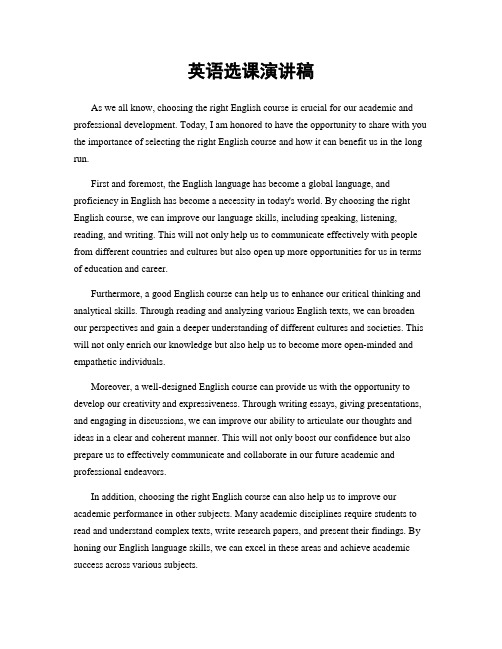
英语选课演讲稿As we all know, choosing the right English course is crucial for our academic and professional development. Today, I am honored to have the opportunity to share with you the importance of selecting the right English course and how it can benefit us in the long run.First and foremost, the English language has become a global language, and proficiency in English has become a necessity in today's world. By choosing the right English course, we can improve our language skills, including speaking, listening, reading, and writing. This will not only help us to communicate effectively with people from different countries and cultures but also open up more opportunities for us in terms of education and career.Furthermore, a good English course can help us to enhance our critical thinking and analytical skills. Through reading and analyzing various English texts, we can broaden our perspectives and gain a deeper understanding of different cultures and societies. This will not only enrich our knowledge but also help us to become more open-minded and empathetic individuals.Moreover, a well-designed English course can provide us with the opportunity to develop our creativity and expressiveness. Through writing essays, giving presentations, and engaging in discussions, we can improve our ability to articulate our thoughts and ideas in a clear and coherent manner. This will not only boost our confidence but also prepare us to effectively communicate and collaborate in our future academic and professional endeavors.In addition, choosing the right English course can also help us to improve our academic performance in other subjects. Many academic disciplines require students to read and understand complex texts, write research papers, and present their findings. By honing our English language skills, we can excel in these areas and achieve academic success across various subjects.Last but not least, a good English course can provide us with the opportunity to explore and appreciate English literature and culture. By studying classic and contemporary literary works, we can gain insights into the human experience and the complexities of the world we live in. This will not only enrich our inner world but also foster a lifelong love for literature and the arts.In conclusion, choosing the right English course is essential for our personal and academic growth. It can improve our language skills, enhance our critical thinking and analytical abilities, develop our creativity and expressiveness, boost our academic performance, and enrich our understanding of literature and culture. Therefore, I urge all of you to carefully consider your options and select an English course that best suits your needs and aspirations. Thank you.。
新编英语演讲与辩论课件Chapter1
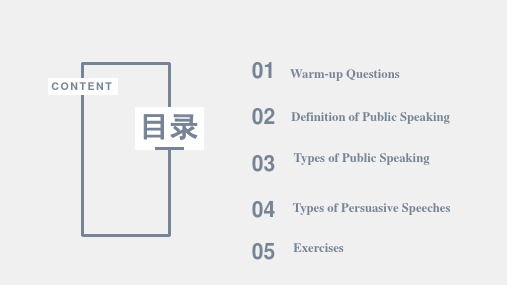
on Questions of Facts
on Questions of Value
on Questions of Policy
Informative Speeches
Speeches About Objects: Principle: find a specific purpose of your speech and do not be too general. Three ways to organize informative speeches: 1. Chronological order 2. Topical order 3. Spatial order
each step of the coursework, and eventually produce a speech.
Exercise 2
i To form groups and each group is to choose a general topic.
The general topics are:
1. Environment 2. College education 3. Internet 4.Tradition
Speeches About Events:
An event is something that happens, especially something important or unusual. Two ways: 1.Chronological order 2. Casual order
Speeches About Concepts
judgment and actions
02
Persuasive Speeches on Questions of Policy:
英语选课代表发言稿范文
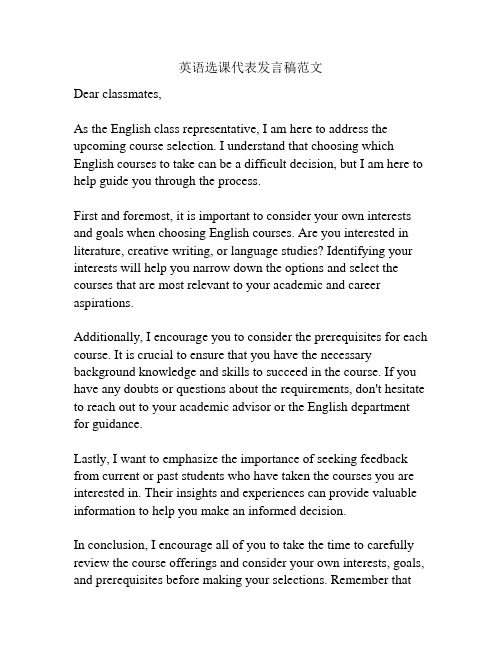
英语选课代表发言稿范文Dear classmates,As the English class representative, I am here to address the upcoming course selection. I understand that choosing which English courses to take can be a difficult decision, but I am here to help guide you through the process.First and foremost, it is important to consider your own interests and goals when choosing English courses. Are you interested in literature, creative writing, or language studies? Identifying your interests will help you narrow down the options and select the courses that are most relevant to your academic and career aspirations.Additionally, I encourage you to consider the prerequisites for each course. It is crucial to ensure that you have the necessary background knowledge and skills to succeed in the course. If you have any doubts or questions about the requirements, don't hesitate to reach out to your academic advisor or the English department for guidance.Lastly, I want to emphasize the importance of seeking feedback from current or past students who have taken the courses you are interested in. Their insights and experiences can provide valuable information to help you make an informed decision.In conclusion, I encourage all of you to take the time to carefully review the course offerings and consider your own interests, goals, and prerequisites before making your selections. Remember thatyour choice of English courses can have a significant impact on your academic and professional development, so choose wisely.Thank you for your attention, and best of luck with your course selections. If you have any further questions or need assistance, please feel free to reach out to me or the English department.Sincerely,[Your Name]。
选课代表英文发言稿范文
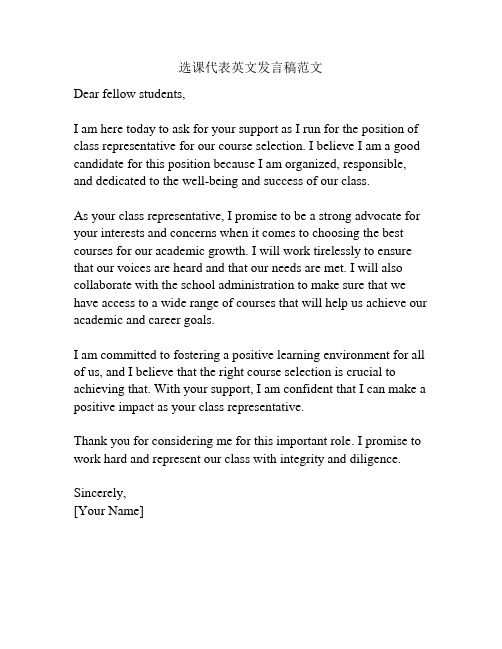
选课代表英文发言稿范文Dear fellow students,I am here today to ask for your support as I run for the position of class representative for our course selection. I believe I am a good candidate for this position because I am organized, responsible, and dedicated to the well-being and success of our class.As your class representative, I promise to be a strong advocate for your interests and concerns when it comes to choosing the best courses for our academic growth. I will work tirelessly to ensure that our voices are heard and that our needs are met. I will also collaborate with the school administration to make sure that we have access to a wide range of courses that will help us achieve our academic and career goals.I am committed to fostering a positive learning environment for all of us, and I believe that the right course selection is crucial to achieving that. With your support, I am confident that I can make a positive impact as your class representative.Thank you for considering me for this important role. I promise to work hard and represent our class with integrity and diligence. Sincerely,[Your Name]。
英语演讲选修课4introduction
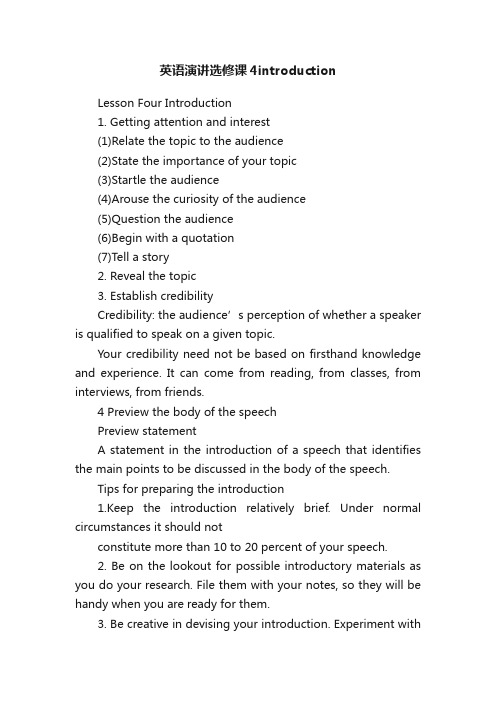
英语演讲选修课4introductionLesson Four Introduction1. Getting attention and interest(1)Relate the topic to the audience(2)State the importance of your topic(3)Startle the audience(4)Arouse the curiosity of the audience(5)Question the audience(6)Begin with a quotation(7)Tell a story2. Reveal the topic3. Establish credibilityCredibility: the audience’s perception of whether a speaker is qualified to speak on a given topic.Your credibility need not be based on firsthand knowledge and experience. It can come from reading, from classes, from interviews, from friends.4 Preview the body of the speechPreview statementA statement in the introduction of a speech that identifies the main points to be discussed in the body of the speech.Tips for preparing the introduction1.Keep the introduction relatively brief. Under normal circumstances it should notconstitute more than 10 to 20 percent of your speech.2. Be on the lookout for possible introductory materials as you do your research. File them with your notes, so they will be handy when you are ready for them.3. Be creative in devising your introduction. Experiment withtwo or three different openings and choose the one that seems most likely to get the audience interested in your speech.4. Don’t worry about the exact wording of your introduction until you have finished preparing the body of the speech. After you have determined your main points, it will be much easier to make final decisions about how to begin the speech.5. Work out your introduction in detail. Some teachers recommend that you write it out word for word; others prefer that you outline it. Whichever method you use, practice the introduction over and over until you can deliver it smoothly from a minimum of notes and with strong eye contact. This will get your speech off to a good start and give you a big boost of confidence.Some common faults of introductionsDon’t apologize.Don’t pretendDon’t make hollow promi sesDon’t rely on gimmicksDon’t preface your introduction1。
- 1、下载文档前请自行甄别文档内容的完整性,平台不提供额外的编辑、内容补充、找答案等附加服务。
- 2、"仅部分预览"的文档,不可在线预览部分如存在完整性等问题,可反馈申请退款(可完整预览的文档不适用该条件!)。
- 3、如文档侵犯您的权益,请联系客服反馈,我们会尽快为您处理(人工客服工作时间:9:00-18:30)。
Tip 2 Express your purpose as a statement, not
as a question 陈述句
• Ineffective: Is China’s space program necessary?
More effective:
To persuade my audience that China’s space program provides many important benefits to people here on earth.
Selecting a topic
Speeches outside the classroom the occasion, the audience, the speaker’s qualifications
Speeches in the public speaking class no designated topic
Limited in scope dividing the topic into several significant parts.
Determining your purpose
General purpose: the broad goal 总体目标
To inform: convey information enhance the knowledge and understanding
speech.). 简单的肯定句
Topic: Emergencies General purpose: To inform Specific purpose: To inform my audience of the major
steps in responding to an emergency
Tip 3 Avoid figurative language比喻语 言
To inform my audience that yoga is extremely cool.
To inform my audience how yoga can improve their health.
Tip 4 Limit your purpose statement to one distinct idea, or one main point
What is a suitable speech topic?
Worthwhile Appropriate Limited in scope
Suitable topic
Worthwhile significant implications for the audience
Appropriate know a lot, like to learn more
To inform my audience about the recent testing procedures for HIV infection.
Tip 5 Make sure your specific purpose is not too
vague or general
Example
Ineffective: To persuade my audience that something must be
kinds of calend来自rs used in the world today.
历法主要分为阳历、阴历和阴阳历三种。阳历亦 即太阳历,主要根据地球绕太阳一周为一年,现 时国际通用的公历(格里历)即为阳历的一种, 亦简称为阳历;阴历亦称月亮历,主要根据月亮 绕地球运行一周时间为一个月(29.59059天),大 月30天,小月29天,一年12个月354天或355天,伊 斯兰历即为阴历的一种;阴阳历以月亮绕地球一 周为1个月,但设置闰月,使得一年的平均天数与 太阳年的天数相符,因此这种历法与月相相符, 也与地球绕太阳周期运动相符合。农历就是阴阳 历的一种。
Tips for formulating the specific purpose statement
Tip 1: Write the purpose statement as a full infinitive phrase(完整的短语), not as a
fragment(片段) Calendars To inform my audience about the three major
Explain ←→ exhort
Specific Purpose
Specific purpose: ( single infinitive phrase that states precisely what a speaker hopes to accomplish in his or her
• Ineffective: To inform my audience about the developments of AIDS and
the recent testing procedures for HIV infection. • More effective: To persuade my audience about the developments of AIDS.
To persuade: advocate or partisan Change or structure the attitudes or actions
Difference: explain or exhort
Specific purpose 具体目标 to inform my audience about… to persuade my audience to …
Chapter 2
Selecting a topic and purpose
Today’s schedule
Choosing a topic Determining the purpose Tips for formulating the specific purpose Phrasing the central idea
